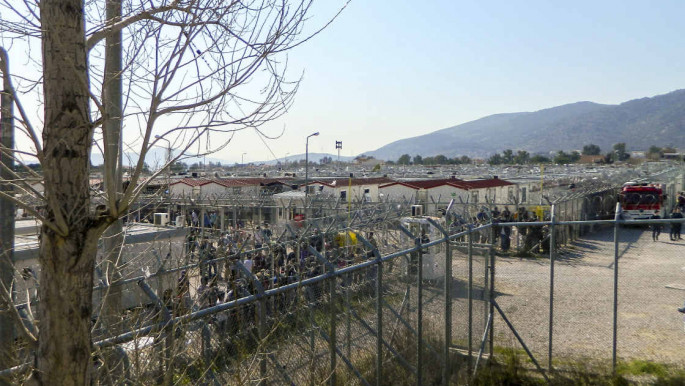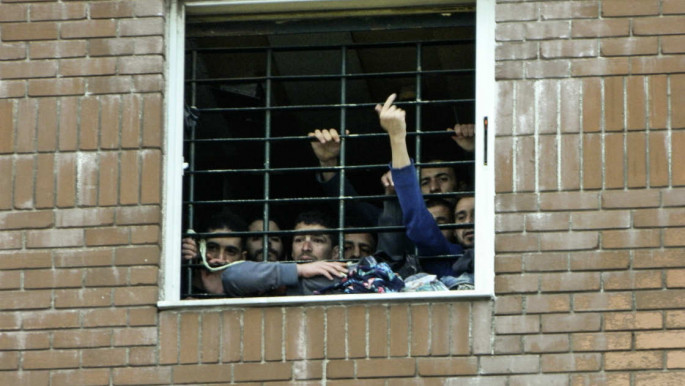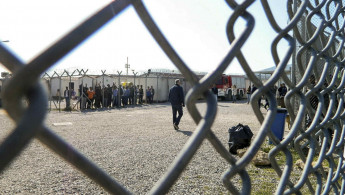Desperate conditions in Greece's migration jails, despite reform promises
Greece has struggled to implement the controversial EU-Turkey deal agreed last March, and many who arrived on the islands after March 19, 2016, ended up being held in closed detention facilities for months on end.
This treatment of new arrivals is likely to only become even more strict. Greek authorities are building new detention facilities for irregular migrants on Samos, Lesvos and Kos, while looking for spaces in the islands of Leros and Chios.
Maarten Verwey, coordinator for the implementation of the EU-Turkey agreement, said that new detention facilities in Greece would be temporary.
But a year ago, the UN's refugee agency decided not to back Greek authorities. "We will not provide support to mandatory 'detention centers' for refugees in Greece," said an official announcement from the UNHCR.
No hot water, no heating, no medicine
Greece is using ex-military camps, police stations and specially built detention centres to house those seeking refuge in the medium term. These are different from the reception and identification centres at the hotspots where newly arrived refugees and migrants are initially held.
There are currently six detention centres with a total of 5,215 places in Amygdaleza, Petrou Ralli, Corinth, Paranesti, Xanthi and Orestiada.
 |
| The Amygdaleza centre is vast, dirty and overcrowded [Katja Lihtenvalner] |
A new report, titled Forgotten, by Aitima, an Athens-based NGO, says there are some 2,000 "irregular migrants" now detained in Greece - but this number might increase fast in the next few months as pre-departure facilities on the islands are completed.
Officials believe that the creation of "closed-structure facilities", each with a capacity of 150-200 people, will be the key to easing pressure on islands where more than 10,000 new arrivals are stranded.
Conditions inside existing detention facilities in Greece continue to be alarming.
 |
| Those held at Amygdaleza are desperate to get out [Katja Lihtenvalner] |
Most are without hot water, reports Aitima. They have no heating, there are no interpreters, no social workers and no psychologists. Detained migrants complain about inedible food. No provisions of clothes and shoes from the authorities are given. Doctors visit detention areas only in very urgent cases.
"Police officers in prisons decide if a detained woman is allowed to see a doctor or not," Alexia Tsouni of To Mov, a feminist activist collective, told The New Arab.
The New Arab visited Hellinikon Women's Detention Facility and can confirm the shocking conditions to be found there.
"A woman from Senegal has not been able to stand up for days now," another imprisoned woman told us. "She doesn't take a shower, she stopped eating and talking. She is facing serious mental problems - but police officers don't want to take her to the hospital."
Similiar complains are coming also from other detention facilities.
"An Algerian man was, for days, asking police to call the doctor but help was denied to him," said a statement by Solidarity With Prisoners From The South, a group which follows the cases of imprisoned migrants.
 |
| Refugees are crammed into rooms at the Petrou Ralli detention centre [Katja Lihtenvalner] |
The 45-year-old man died on February 6, jailed in the Petrou Ralli detention centre. He was the sixth migrant to die in a government-run facility this year.
The denial of medical treatment has preceded most of these deaths. A woman from Afghanistan told us she lost her child while detained, as police didn't want to take her to hospital after she felt a strong pain in her stomach.
A few days later, she miscarried. Her unborn baby, dead.
Health problems due to the unsanitary conditions here are another serious issue.
"[There are] no cleaning products to clean the toilets and cells. Migrants can clean the spaces, and even the toilet, but only with water. Bedding is provided but is dirty. Many detainees complained of bugs - the cause of skin problems," reports Aitima.
 |
| New arrivals to Greece are kept imprisoned for months on end, subject to the whims of police departments [Katja Lihtenvalner] |
Children detained
"We continously see cases of detained children together with mothers or unaccompanied minors. Just recently there was a case of a 15-year-old Syrian girl who escaped the violence and misery in her country to end up in a Greek jail," Tsouni of To Mov tells us.
Teenagers are frequently detained by the Greek police, with many children ending up, unaccompanied, in police stations and detention facilities around Greece - held for not possessing proper documents.
"The authorities undertake certain medical exams to confirm if someone is underage. This is of course problematic. Then they take the role of a so-called 'protector', and with this excuse detain underage migrants," lawyer Evgenia Kouniaki tells The New Arab.
The plight of asylum seekers - who have escaped enduring wars, regional conflicts and political persecution - is another controversy.
During our visits we met refugees from Syria, Iraq, Afganistan, Iran, Congo, and Somalia.
"No one explains to us anything - I don't know even why I am here," the woman from Iraq complains to us.
The lack of legal support and interpretation services are the tip of the iceberg of the inhuman and desperate situation here in Greek detention facilities.
Without legal help and no one to monitor detention conditions, migrants end up detained for months.
"Many of them have no contact with their families, as for this they need a telephone card and money to buy it. As a consequence, they stay lost and miserable," Tsouni explains.
Greek detention facilities are run exclusively by police authorities. They continue to make determinations over the continuing detention of asylum applicants.
"In some cases we noticed that police authorities are enforcing the detention measure, despite the previous ineffective detention," Aitima reports.
 |
| The inmates at Petrou Ralli have been let down by the left-wing government, say activists [Katja Lihtenvalner] |
Syriza swallowing promises
It was just two years ago when the mainly left-wing Greek government took power and Minister for Public Order Yannis Pannousis assured: "Detention centres - we are finished with them!"
At the time, nearly 7,000 migrants were released from the detention facilities. Only a few hundred remained.
This stopped a year ago when the refugee influx swamped Greece and the northern border started to close down.
Suddenly, there were a large number of people on the mainland - both inside and outside the camps - who lacked legal documents. The authorities found themselves unprepared, and the system of detention, which left-wing Syriza sternly criticised while in opposition, became convenient once more.
Requests for comment on this investigation made to Greece's Ministry For Public Order, responsible for migrants, refugees and asylum seekers, went unanswered by time of publication.
"Migrants are still detained for an unpredictable period of time, despite government promises. If police authorities decide, for any reason, to keep a migrant detained, they charge them on public order grounds," said Kouniakis.
Detained arrivals in Greece are completely exposed to the whims of police authorities - and new detention facilities appear unlikely to bring any changes.
"Newly built closed-type pre-departure centres on the islands will have only one goal: to detain migrants before their deportation to Turkey or their country of origin," concludes Kouniakis. "This is of course, seriously troubling."
Katja Lihtenvalner is a freelance journalist and researcher based in Athens. Follow her on Twitter: @Lihtenvalner



